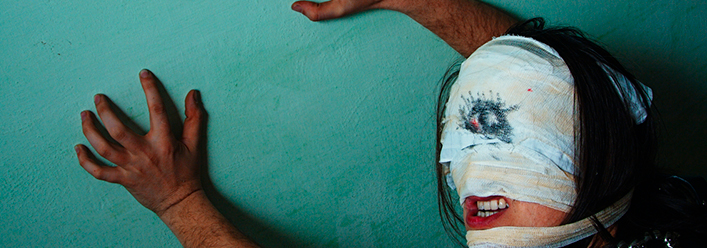SCHIZOTYPAL PERSONALITY DISORDER
GENERAL INFORMATION
Schizotypal Personality Disorder is characterized by a marked pattern of social isolation, inability to establish intimate bonds and accept lasting responsibilities. It presents with a seemingly meaningless behavior and language, which varies and changes context when a person with this disorder is speaking.
The more isolated from social environments the person suffering from the disorder is, the more he or she loses contact with the conventionalities of language and behavior. Therefore, the person suffering will gradually begin to act, think and perceive his or her environment in a peculiar and unrealistic way.
The difficulty to relate to things or live events, generates a flattened affect and fear of rejection or humiliation, thus increasing the isolation of the person. People with this disorder have feelings of emptiness and insignificance, and the anxiety that this vacuum generates can trigger psychotic outbreaks.

FREQUENTLY ASKED QUESTIONS
What characterizes Schizotypal Personality Disorder?
People with this disorder can behave in a rare, reserved, curious or strange manner that is socially inappropriate. They will prefer privacy and isolation, making few attempts to contact others or commit to personal obligations; over time they will acquire increasingly peripheral work roles and marginal social activities. The capacity to process thoughts (ideas during a conversation) and feelings of others is markedly dysfunctional. They confuse social communication with personal irrelevance, and their language is circumstantial. They tend to confuse reality and fantasy. They have experiences of depersonalization, derealization and dissociation; They can see themselves as forsaken, with repetitive thoughts of life being empty and with no meaning.
What is the treatment for Schizotypal Personality Disorder?
At CADE, interdisciplinary work is focused on preventing social isolation, nullifying dependence on other people, reducing worries caused by fantasies, correcting eccentric behaviors, reversing the cognitive style and reconstructing the self-image.
How can I identify a person with Schizotypal Personality Disorder?
In general, a person can be easily identified by an extravagant way of dressing. When establishing a conversation with a person suffering from this disorder, he or she will usually speak only of a few topics, usually those that demand their immediate attention. If they engage in a conversation, they can force it beyond what is appropriate, falling into deviations or interruptions—rare or metaphorical. They usually lack the energy to empathize with others.
Does this disorder begin at an older age?
Despite the fact that this disorder has well-defined symptoms in adulthood, the first symptoms may appear around four or five years of age. They can often become the target of ridicule and contempt because family and society (classmates, etc.) will interpret their behavior as peculiar and distorted. The person suffering this disorder will often misinterpret the intentions of others and respond irrelevantly, so they are then considered eccentric and peculiar.
What other disorders can be confused with Schizotypal Personality Disorder (SPD)?
This disorder can be confused with Depersonalization Disorder. It can be considered as residual schizophrenia only if there has been the existence of a previous psychotic episode. The disorder with which this disorder is most often confused is with the Schizoid Personality Disorder. We must pay attention to the main symptoms of SPD; social isolation, suspicious or abundant eccentricities in thinking, perception and behavior, for making a differential diagnosis.
OUR TREATMENT MODEL
CADE offers a multidisciplinary treatment according to the characteristics and needs of the patient that is based on the patient´s diagnosis and an individual intervention plan.
A psychological or psychiatric disorder generally has a genetic or biological origin detonated by difficult and early or current traumatic experiences that lead the individual to become ill. Therefore, the clinical intervention in these disorders necessitates the multidisciplinary work of psychiatry, psychology, medicine, nutrition and complementary therapies. The treatment can be outpatient, inpatient or semi-inpatient based.



 +52 (33) 12 04 03 43
+52 (33) 12 04 03 43 +52 (33) 14 85 14 85
+52 (33) 14 85 14 85


